Tesco PLC: Assessing the External Environment Through PESTLE Analysis
VerifiedAdded on 2023/06/17
|5
|887
|307
Report
AI Summary
This report provides an analysis of Tesco PLC's external business environment using the PESTLE framework. It examines political factors such as trade restrictions and taxation policies, economic factors like inflation, social factors including consumer preferences for healthier foods, technological advancements such as the grocery app, legal challenges related to consumer rights, and environmental pressures for sustainable practices. The analysis concludes that monitoring the business environment is crucial for understanding external influences and managing risk, highlighting the importance of adapting to changes to maintain brand trustworthiness and environmental responsibility. The report references academic journals and books to support its findings, emphasizing the need for Tesco PLC to address environmental issues and adhere to legal standards to improve its operations and maintain a positive brand image.
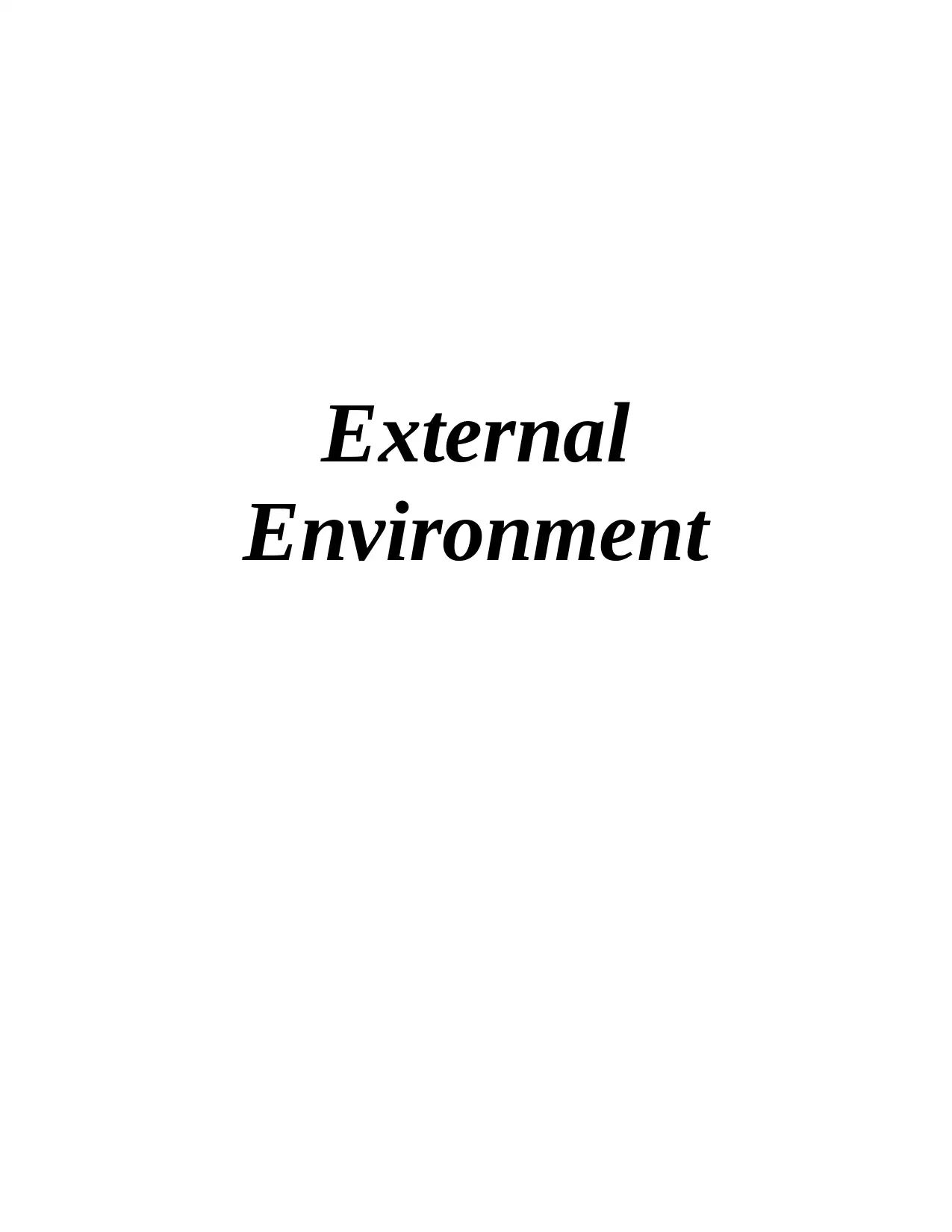
External
Environment
Environment
Paraphrase This Document
Need a fresh take? Get an instant paraphrase of this document with our AI Paraphraser
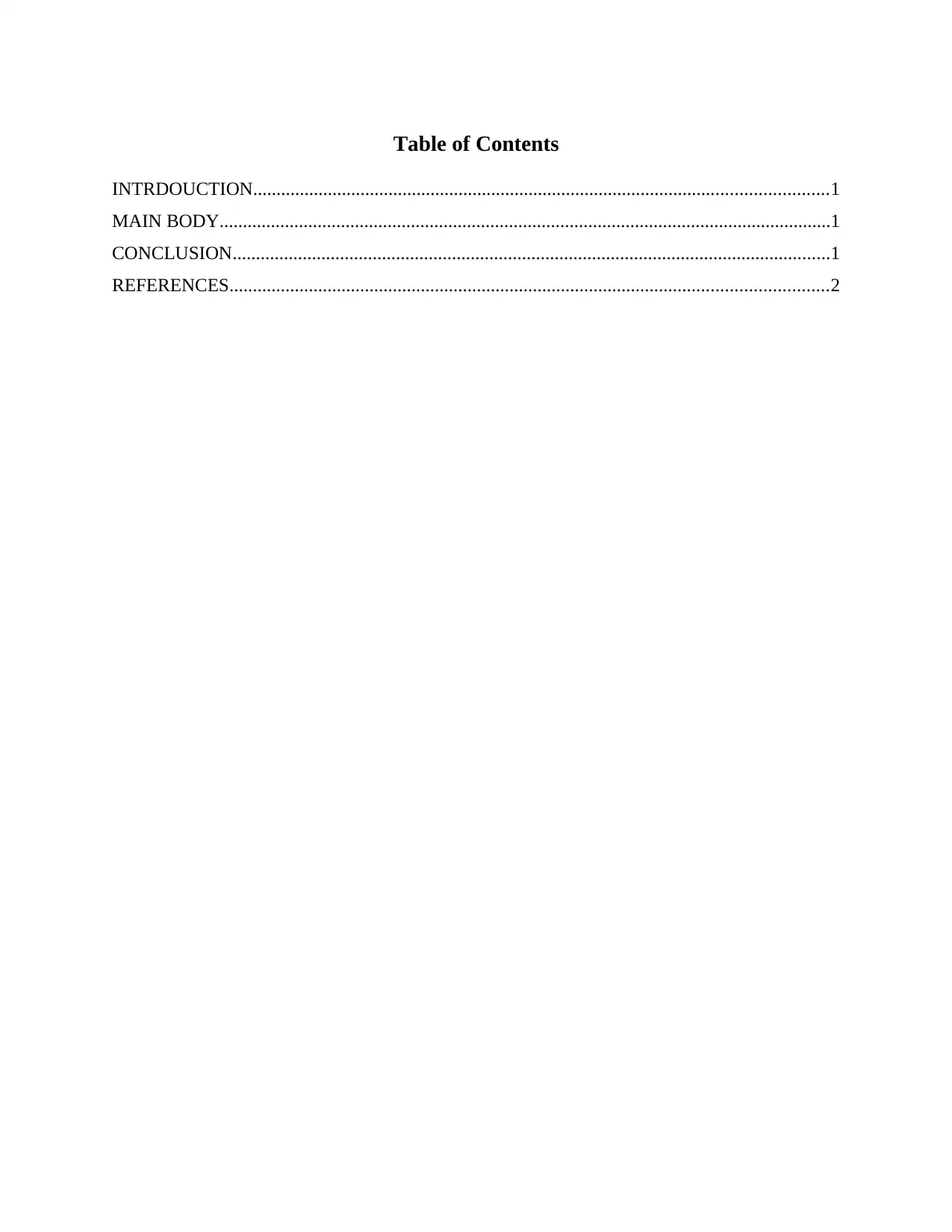
Table of Contents
INTRDOUCTION...........................................................................................................................1
MAIN BODY...................................................................................................................................1
CONCLUSION................................................................................................................................1
REFERENCES................................................................................................................................2
INTRDOUCTION...........................................................................................................................1
MAIN BODY...................................................................................................................................1
CONCLUSION................................................................................................................................1
REFERENCES................................................................................................................................2
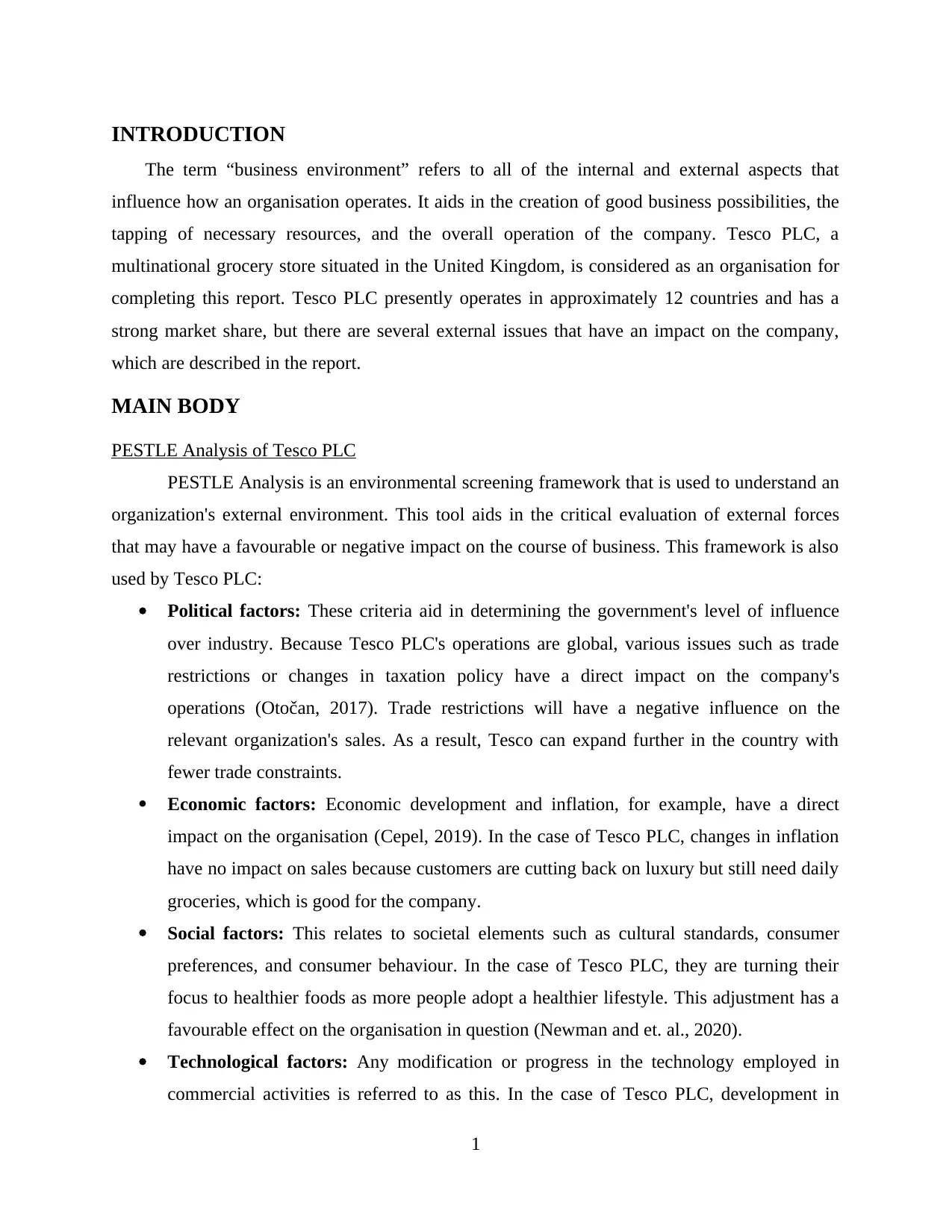
INTRODUCTION
The term “business environment” refers to all of the internal and external aspects that
influence how an organisation operates. It aids in the creation of good business possibilities, the
tapping of necessary resources, and the overall operation of the company. Tesco PLC, a
multinational grocery store situated in the United Kingdom, is considered as an organisation for
completing this report. Tesco PLC presently operates in approximately 12 countries and has a
strong market share, but there are several external issues that have an impact on the company,
which are described in the report.
MAIN BODY
PESTLE Analysis of Tesco PLC
PESTLE Analysis is an environmental screening framework that is used to understand an
organization's external environment. This tool aids in the critical evaluation of external forces
that may have a favourable or negative impact on the course of business. This framework is also
used by Tesco PLC:
Political factors: These criteria aid in determining the government's level of influence
over industry. Because Tesco PLC's operations are global, various issues such as trade
restrictions or changes in taxation policy have a direct impact on the company's
operations (Otočan, 2017). Trade restrictions will have a negative influence on the
relevant organization's sales. As a result, Tesco can expand further in the country with
fewer trade constraints.
Economic factors: Economic development and inflation, for example, have a direct
impact on the organisation (Cepel, 2019). In the case of Tesco PLC, changes in inflation
have no impact on sales because customers are cutting back on luxury but still need daily
groceries, which is good for the company.
Social factors: This relates to societal elements such as cultural standards, consumer
preferences, and consumer behaviour. In the case of Tesco PLC, they are turning their
focus to healthier foods as more people adopt a healthier lifestyle. This adjustment has a
favourable effect on the organisation in question (Newman and et. al., 2020).
Technological factors: Any modification or progress in the technology employed in
commercial activities is referred to as this. In the case of Tesco PLC, development in
1
The term “business environment” refers to all of the internal and external aspects that
influence how an organisation operates. It aids in the creation of good business possibilities, the
tapping of necessary resources, and the overall operation of the company. Tesco PLC, a
multinational grocery store situated in the United Kingdom, is considered as an organisation for
completing this report. Tesco PLC presently operates in approximately 12 countries and has a
strong market share, but there are several external issues that have an impact on the company,
which are described in the report.
MAIN BODY
PESTLE Analysis of Tesco PLC
PESTLE Analysis is an environmental screening framework that is used to understand an
organization's external environment. This tool aids in the critical evaluation of external forces
that may have a favourable or negative impact on the course of business. This framework is also
used by Tesco PLC:
Political factors: These criteria aid in determining the government's level of influence
over industry. Because Tesco PLC's operations are global, various issues such as trade
restrictions or changes in taxation policy have a direct impact on the company's
operations (Otočan, 2017). Trade restrictions will have a negative influence on the
relevant organization's sales. As a result, Tesco can expand further in the country with
fewer trade constraints.
Economic factors: Economic development and inflation, for example, have a direct
impact on the organisation (Cepel, 2019). In the case of Tesco PLC, changes in inflation
have no impact on sales because customers are cutting back on luxury but still need daily
groceries, which is good for the company.
Social factors: This relates to societal elements such as cultural standards, consumer
preferences, and consumer behaviour. In the case of Tesco PLC, they are turning their
focus to healthier foods as more people adopt a healthier lifestyle. This adjustment has a
favourable effect on the organisation in question (Newman and et. al., 2020).
Technological factors: Any modification or progress in the technology employed in
commercial activities is referred to as this. In the case of Tesco PLC, development in
1
⊘ This is a preview!⊘
Do you want full access?
Subscribe today to unlock all pages.

Trusted by 1+ million students worldwide
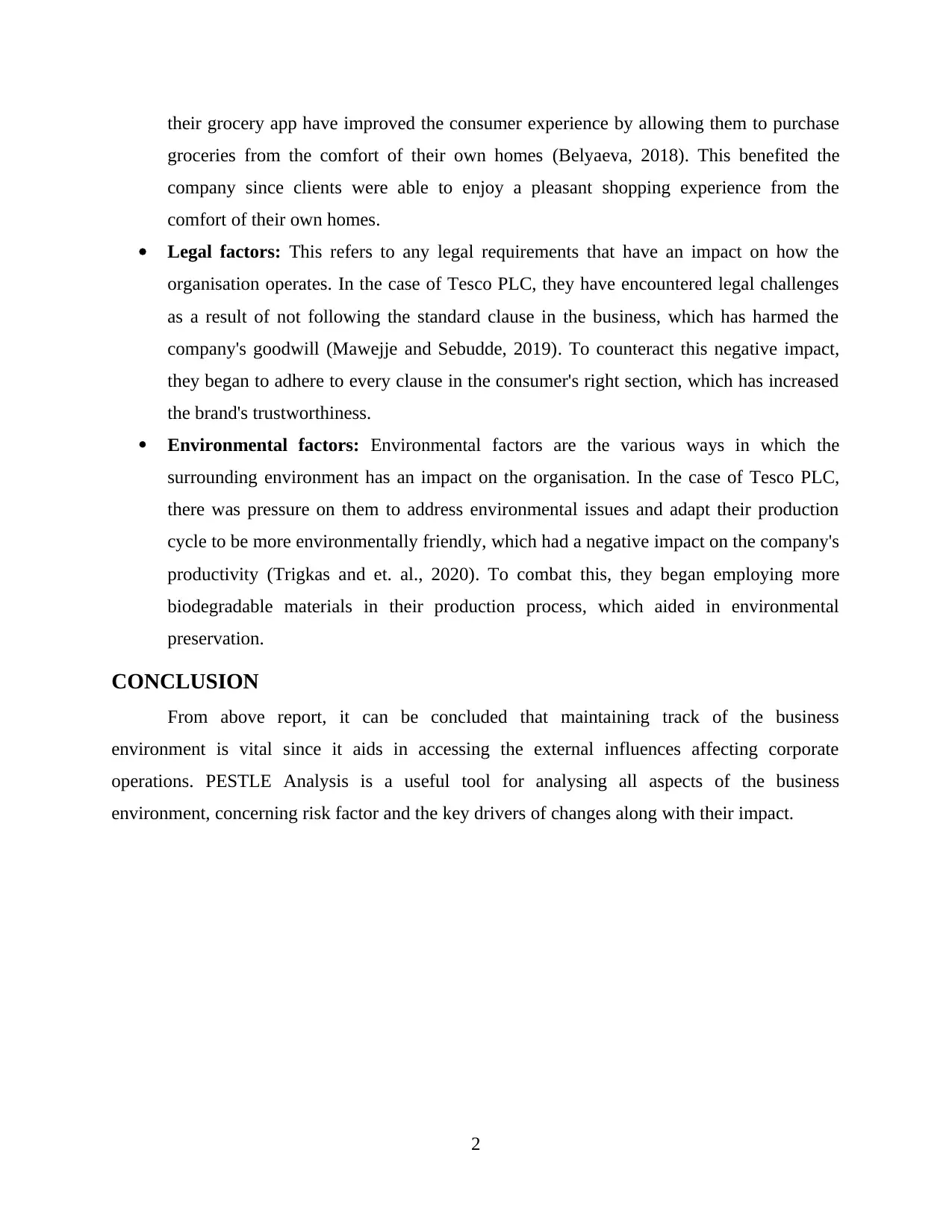
their grocery app have improved the consumer experience by allowing them to purchase
groceries from the comfort of their own homes (Belyaeva, 2018). This benefited the
company since clients were able to enjoy a pleasant shopping experience from the
comfort of their own homes.
Legal factors: This refers to any legal requirements that have an impact on how the
organisation operates. In the case of Tesco PLC, they have encountered legal challenges
as a result of not following the standard clause in the business, which has harmed the
company's goodwill (Mawejje and Sebudde, 2019). To counteract this negative impact,
they began to adhere to every clause in the consumer's right section, which has increased
the brand's trustworthiness.
Environmental factors: Environmental factors are the various ways in which the
surrounding environment has an impact on the organisation. In the case of Tesco PLC,
there was pressure on them to address environmental issues and adapt their production
cycle to be more environmentally friendly, which had a negative impact on the company's
productivity (Trigkas and et. al., 2020). To combat this, they began employing more
biodegradable materials in their production process, which aided in environmental
preservation.
CONCLUSION
From above report, it can be concluded that maintaining track of the business
environment is vital since it aids in accessing the external influences affecting corporate
operations. PESTLE Analysis is a useful tool for analysing all aspects of the business
environment, concerning risk factor and the key drivers of changes along with their impact.
2
groceries from the comfort of their own homes (Belyaeva, 2018). This benefited the
company since clients were able to enjoy a pleasant shopping experience from the
comfort of their own homes.
Legal factors: This refers to any legal requirements that have an impact on how the
organisation operates. In the case of Tesco PLC, they have encountered legal challenges
as a result of not following the standard clause in the business, which has harmed the
company's goodwill (Mawejje and Sebudde, 2019). To counteract this negative impact,
they began to adhere to every clause in the consumer's right section, which has increased
the brand's trustworthiness.
Environmental factors: Environmental factors are the various ways in which the
surrounding environment has an impact on the organisation. In the case of Tesco PLC,
there was pressure on them to address environmental issues and adapt their production
cycle to be more environmentally friendly, which had a negative impact on the company's
productivity (Trigkas and et. al., 2020). To combat this, they began employing more
biodegradable materials in their production process, which aided in environmental
preservation.
CONCLUSION
From above report, it can be concluded that maintaining track of the business
environment is vital since it aids in accessing the external influences affecting corporate
operations. PESTLE Analysis is a useful tool for analysing all aspects of the business
environment, concerning risk factor and the key drivers of changes along with their impact.
2
Paraphrase This Document
Need a fresh take? Get an instant paraphrase of this document with our AI Paraphraser
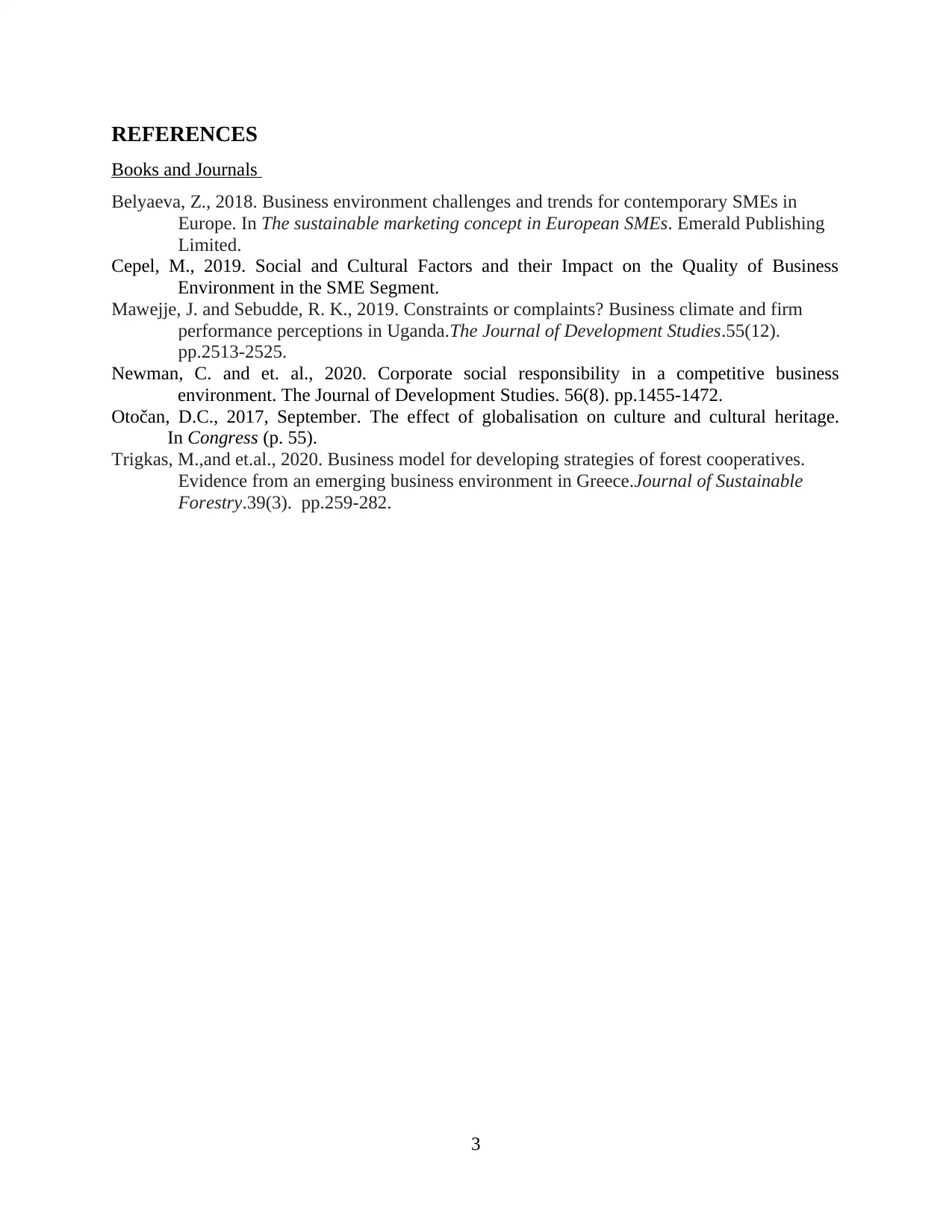
REFERENCES
Books and Journals
Belyaeva, Z., 2018. Business environment challenges and trends for contemporary SMEs in
Europe. In The sustainable marketing concept in European SMEs. Emerald Publishing
Limited.
Cepel, M., 2019. Social and Cultural Factors and their Impact on the Quality of Business
Environment in the SME Segment.
Mawejje, J. and Sebudde, R. K., 2019. Constraints or complaints? Business climate and firm
performance perceptions in Uganda.The Journal of Development Studies.55(12).
pp.2513-2525.
Newman, C. and et. al., 2020. Corporate social responsibility in a competitive business
environment. The Journal of Development Studies. 56(8). pp.1455-1472.
Otočan, D.C., 2017, September. The effect of globalisation on culture and cultural heritage.
In Congress (p. 55).
Trigkas, M.,and et.al., 2020. Business model for developing strategies of forest cooperatives.
Evidence from an emerging business environment in Greece.Journal of Sustainable
Forestry.39(3). pp.259-282.
3
Books and Journals
Belyaeva, Z., 2018. Business environment challenges and trends for contemporary SMEs in
Europe. In The sustainable marketing concept in European SMEs. Emerald Publishing
Limited.
Cepel, M., 2019. Social and Cultural Factors and their Impact on the Quality of Business
Environment in the SME Segment.
Mawejje, J. and Sebudde, R. K., 2019. Constraints or complaints? Business climate and firm
performance perceptions in Uganda.The Journal of Development Studies.55(12).
pp.2513-2525.
Newman, C. and et. al., 2020. Corporate social responsibility in a competitive business
environment. The Journal of Development Studies. 56(8). pp.1455-1472.
Otočan, D.C., 2017, September. The effect of globalisation on culture and cultural heritage.
In Congress (p. 55).
Trigkas, M.,and et.al., 2020. Business model for developing strategies of forest cooperatives.
Evidence from an emerging business environment in Greece.Journal of Sustainable
Forestry.39(3). pp.259-282.
3
1 out of 5
Related Documents
Your All-in-One AI-Powered Toolkit for Academic Success.
+13062052269
info@desklib.com
Available 24*7 on WhatsApp / Email
![[object Object]](/_next/static/media/star-bottom.7253800d.svg)
Unlock your academic potential
Copyright © 2020–2026 A2Z Services. All Rights Reserved. Developed and managed by ZUCOL.


